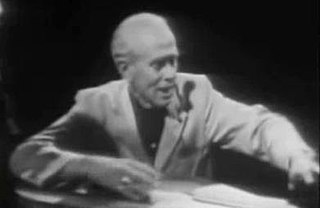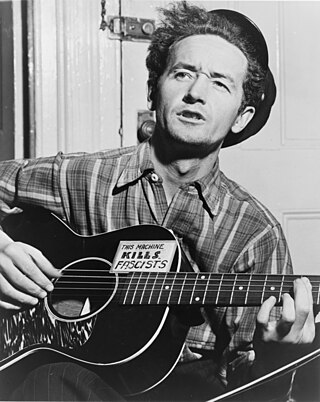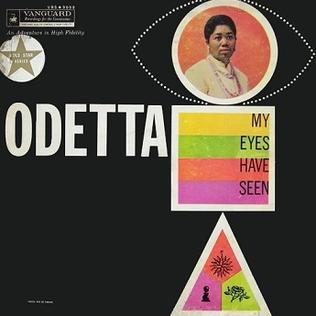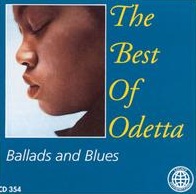
Odetta Holmes, known as Odetta, was an American singer, often referred to as "The Voice of the Civil Rights Movement". Her musical repertoire consisted largely of American folk music, blues, jazz, and spirituals. An important figure in the American folk music revival of the 1950s and 1960s, she influenced many of the key figures of the folk-revival of that time, including Bob Dylan, Joan Baez, Mavis Staples, and Janis Joplin. In 2011 Time magazine included her recording of "Take This Hammer" on its list of the 100 Greatest Popular Songs, stating that "Rosa Parks was her No. 1 fan, and Martin Luther King Jr. called her the queen of American folk music."

John Jacob Niles was an American composer, singer and collector of traditional ballads. Called the "Dean of American Balladeers," Niles was an important influence on the American folk music revival of the 1950s and 1960s, with Odetta, Joan Baez, Burl Ives, Peter, Paul and Mary and Bob Dylan, among others, recording his songs.

The Tin Angel is Odetta & Larry's only album, and the first recording by Odetta, originally released in September 1954 on Fantasy Records.

Odetta Sings Ballads and Blues is the debut solo album by American folk singer Odetta. It was released in November 1956 by Tradition Records.

Odetta is a 1963 compilation album by American folk singer Odetta. Odetta is the first official compilation of Odetta songs. It features songs from her two albums on the Tradition label, Odetta Sings Ballads and Blues and At the Gate of Horn and a few tracks from Odetta and Larry LP, The Tin Angle.
"God's Gonna Cut You Down" is a traditional American folk song. The track has been recorded in a variety of genres, including country, folk, alternative rock, electronic and black metal. The lyrics warn evildoers that they cannot avoid God's eventual judgment.

The American folk music revival began during the 1940s and peaked in popularity in the mid-1960s. Its roots went earlier, and performers like Josh White, Burl Ives, Woody Guthrie, Lead Belly, Big Bill Broonzy, Richard Dyer-Bennet, Oscar Brand, Jean Ritchie, John Jacob Niles, Susan Reed, Paul Robeson, Bessie Smith, Ma Rainey and Cisco Houston had enjoyed a limited general popularity in the 1930s and 1940s. The revival brought forward styles of American folk music that had in earlier times contributed to the development of country and western, blues, jazz, and rock and roll music.
Michael Johnathon is an American folk singer-songwriter, producer, author, and playwright. He has released 20 albums, published 5 books, a play, composed an opera, performs with symphony orchestras and in coffee houses, completed a motion picture script, created three volunteer organizations and tours nationwide.
Tradition Records was an American record label from 1955 to 1966 that specialized in folk music. The label was founded and financed by Guggenheim heiress Diane Hamilton in 1956. Its president and director was Patrick "Paddy" Clancy, who was soon to join his brothers Liam and Tom Clancy and Tommy Makem, as part of the new Irish folk group, The Clancy Brothers and Tommy Makem. Liam Clancy designed the company's maple leaf logo. Columbia University Professor of Folklore Kenneth Goldstein was also involved in the early creation of the company, which operated out of Greenwich Village, New York, United States.
"Keep Your Eyes on the Prize" is a folk song that became influential during the American Civil Rights Movement of the 1950s and 1960s. It is based on the traditional song, "Gospel Plow," also known as "Hold On," "Keep Your Hand on the Plow," and various permutations thereof.
"Gospel Plow" is a traditional African American spiritual. It is listed in the Roud Folk Song Index, number 10075. The title is biblical, based on Luke 9:62.
Odetta's discography is large and diverse, covering over 50 years and many record labels.

My Eyes Have Seen is a studio album by American folk singer Odetta, first released in July 1959. It is the first record by Odetta to be released by Vanguard Records.

Ballad for Americans and Other American Ballads is an album by American folk singer Odetta. It was released in 1960.

Odetta at Town Hall is a live album by American folk singer Odetta, recorded at Town Hall, New York, NY. At this time, Odetta was at the height of her career and performed an annual concert at the venue, typically in the month of April. It is not clear if this is her 1961 or 1962 concert performance. It could potentially be a compilation of her performances at Town Hall throughout the early 1960s. This album was first issued in 1962, as per the Vanguard Discography logs. The internet and some CD reissues will sometimes incorrectly report that this album was released in 1963.

The Essential Odetta is a live album by American folk singer Odetta, originally released on LP in 1973.

The Best of Odetta: Ballads and Blues is a compilation album by American folk singer Odetta, originally released in 1994.

The Best of the Vanguard Years is a compilation album by American folk singer Odetta, originally released in 1999.

Absolutely the Best is a compilation album by American folk singer Odetta, originally released in 2000.

The Tradition Masters is an album by American folk singer Odetta, released in 2002.














